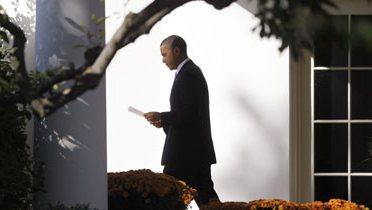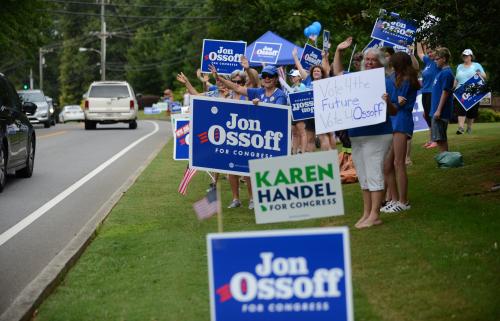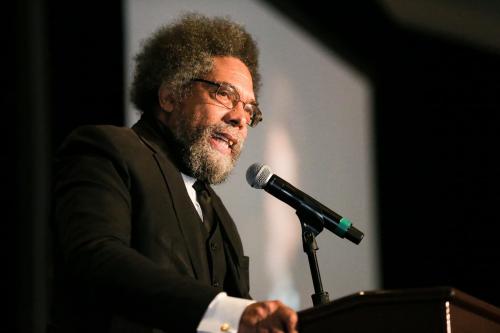The moderators have been chosen for this fall’s presidential debates, and, as of this writing, those selections seem to have assuaged earlier concerns that Donald Trump may forgo one or more of the debates altogether. At the same time, questions about whether Clinton and Trump will be joined by third-party candidates Jill Stein (Green Party) and Gary Johnson (Libertarian party) remain.
After a federal judge threw out their lawsuit against the Commission on Presidential Debates (CPD) in August, Stein’s and Johnson’s last best chance to face the Democratic and Republican nominees in front of the nation is to reach the 15 percent polling average necessary to qualify under the debate commission’s guidelines. The CPD requires that candidates “appear on a sufficient number of state ballots to have a mathematical chance of winning a majority vote in the Electoral College” and “have a level of support of at least 15 percent of the national electorate as determined by five selected national public opinion polling organizations” to qualify. Johnson’s and Stein’s latest poll numbers stand at 9 percent and 3 percent, respectively. Given that, historically, third party candidates’ support in the polls has declined as the election draws near, a sufficient rebound is unlikely.
Even if Johnson and/or Stein experienced an unlikely bump in the polls, political science research gives us reason to be skeptical that presidential debates matter much at all; by the time the debates occur, many voters have already made up their minds, and candidates generally hew closely to their already-familiar messages. Within this context, moreover, two historical examples of third party candidates in debates suggest that it is difficult for third party candidates like Johnson and Stein to use debate participation to pull meaningful support from their major party opponents.
1980: Ronald Reagan and John Anderson
With debate terms in 1980 decided in negotiations between the candidates rather than by an outside commission, Ronald Reagan was insistent that independent candidate John Anderson, who at the time was polling at 14 percent[i], be included in the first debate, going so far as to promise he would not participate if Anderson was not included. Jimmy Carter made the opposite pledge—if Anderson was on the stage then he would not be. As a result, Reagan and Anderson completed the first debate without Carter present on September 21, 1980. Anderson did not, however, participate in the second debate, held on October 28. His poll numbers fell consistently throughout October, and he captured just 6.6 percent of the popular vote. This follows the larger trend in which third party candidates peak in the polls during the summer and steadily decline as the election approaches. In Anderson’s case, his debate debut did little, if anything, to slow his downward momentum.
1992: George H.W. Bush, Bill Clinton, and Ross Perot
While third party candidates generally lose support as the election nears, independent candidate Ross Perot was an exception to this pattern in 1992. While Perot was polling at just 1 percent[ii] a week before the first debate, the CPD had not yet established its 15 percent threshold for qualification and instead relied on an advisory panel to set participation criteria. Perot was included in all three presidential debates, which took place in rapid succession on October 11, 15, and 19, and his participation was followed by a clear boost in the polls. In a Gallup survey conducted immediately after the first debate, 70 percent[iii] of respondents said they took Perot more seriously after watching. In a survey conducted just before the election, meanwhile, 19 percent[iv] of respondents said they would vote for Perot if the election were held that day—a level of support largely borne out at the polls. Perot came away with 18.9 percent of the national popular vote, making him the most successful third party candidate since Theodore Roosevelt ran for a third term as a Progressive in 1912.
The circumstances surrounding Anderson’s and Perot’s debate participation are significantly different, however, than what the third party candidates of 2016 are facing. If a third party candidate participates in the debates this year, it will be because they have met predetermined criteria, unlike Anderson, who Reagan insisted on including partially due to speculation that any support gained by Anderson would be taken away from Carter. And although Perot had almost non-existent support just before the debates, he had led the polls earlier in the year before dropping out of the race in July, then re-entering on October 1. While his Election Day numbers seem to show support gained after the debates, they likely reflect the re-emergence of some of the support he had before he dropped out once it became clear that his candidacy was official again.
But, all hope is not lost for Johnson and Stein. With more voters this cycle looking to vote against a candidate they don’t support rather than for a candidate they do, the electorate may be more open-minded than usual when considering third party candidates. It wouldn’t be the first time this election season has broken with history.
[i] CBS News/New York Times. CBS News/New York Times Poll, Sep, 1980 [survey question]. USCBSNYT.091680.R03A. CBS News/New York Times [producer]. Cornell University, Ithaca, NY: Roper Center for Public Opinion Research, iPOLL [distributor]
[ii] Los Angeles Times. Los Angeles Times Poll, Oct, 1992 [survey question]. USLAT.100792.R13. Los Angeles Times [producer]. Cornell University, Ithaca, NY: Roper Center for Public Opinion Research, iPOLL [distributor]
[iii] Newsweek. Gallup/Newsweek Poll, Oct, 1992 [survey question]. USGALNEW.305050.QB06. Gallup Organization [producer]. Cornell University, Ithaca, NY: Roper Center for Public Opinion Research, iPOLL [distributor]
[iv] Cable News Network, USA Today. Gallup/CNN/USA Today Poll, Oct, 1992 [survey question]. USGALLUP.322030.Q02. Gallup Organization [producer]. Cornell University, Ithaca, NY: Roper Center for Public Opinion Research, iPOLL [distributor]
The Brookings Institution is committed to quality, independence, and impact.
We are supported by a diverse array of funders. In line with our values and policies, each Brookings publication represents the sole views of its author(s).







Commentary
Gary Johnson and Jill Stein: Do the debates really matter?
September 12, 2016